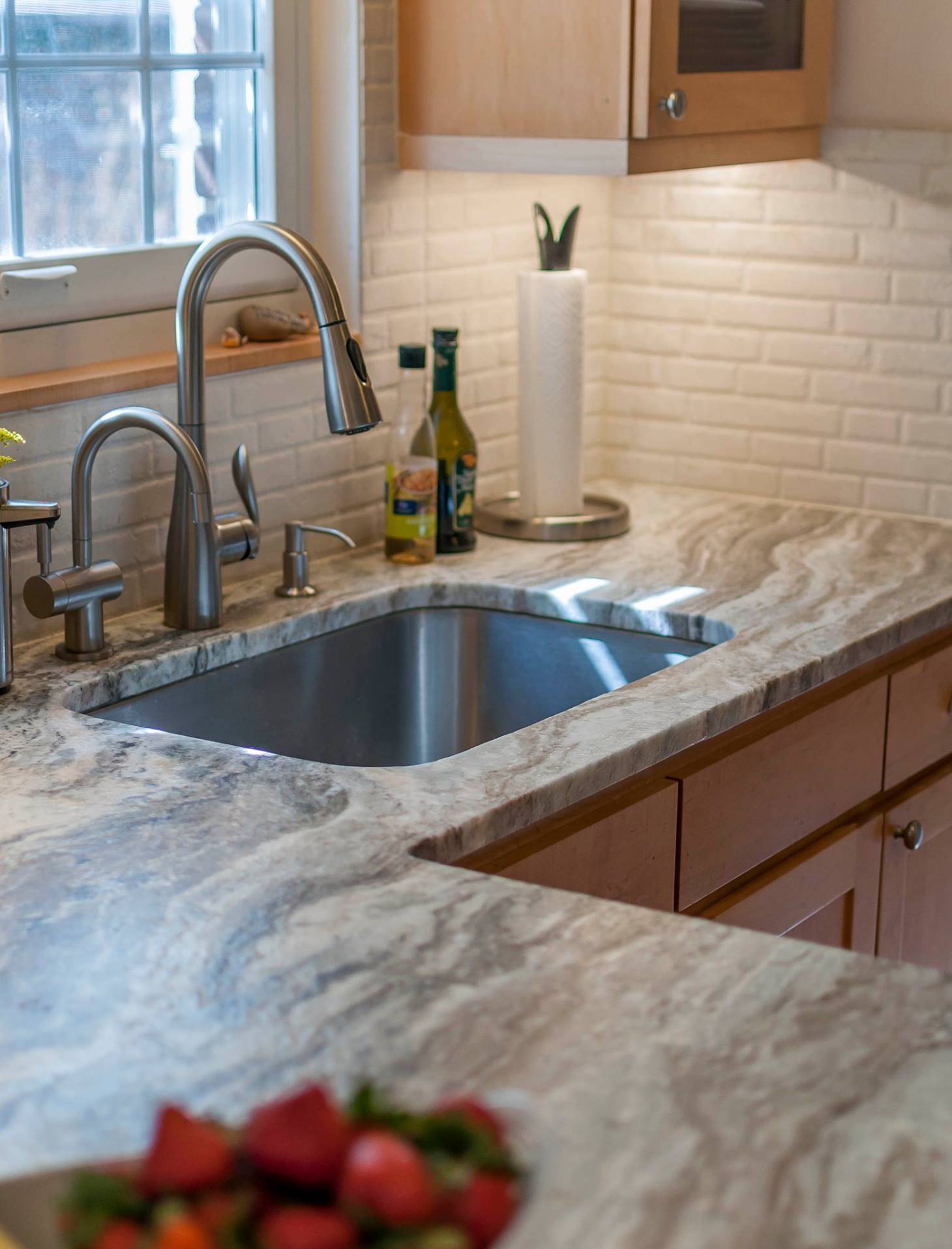Fabricator Focus

Colorado Custom Stone Denver
"We try to be proactive and earn our keep."
All photos courtesy Colorado Custom Stone
(Above) Denver manufacturer BSI gets a snappy reception desk from CCS with Silver Cloud marble from Arizona Tile. (Previous page) An office break-room island features Arctic from Pental Quartz.
COLORADO CUSTOM STONE (CCS) fabricates mainly for commercial work along the state’s metropolitan Front Range area. Going on three decades of operations, CCS has a lengthy list of premium installations, and works with major general contractors in the Denver area. CCS is also a Natural Stone Institute accredited fabricator. Stone Update recently talked with Ron Horn, CCS general manager, about working in the commercial arena and its future in the post-COVID-19 market.
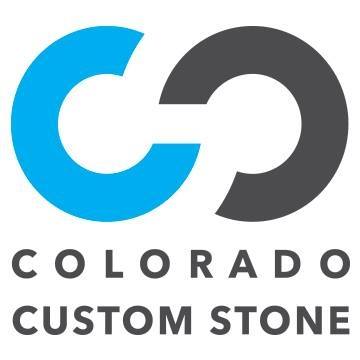
Q: Give us some background. Horn: Colorado Custom Stone (CCS) was founded in 2002. I had been in related business or directly in the fabrication business for a number of years. I just had some ideas that I wanted to implement and I found that difficult to do because other people had their own path and their own ideas. I had some great mentors and partners. I started in the stone business at 20. Nick DiTempora at MAPEI gave me my first start, so I worked for a setting materials manufacturer. I then made my way to Arizona Tile, and that's where I met fabricators, homeowners and people in the A&D community selecting slabs – that is where I got the taste for the fabrication business. In the mid 90’s Steve Sanchez of Master Marble gave me an opportunity to learn the fabrication business. My career went from international manufacturer to regional or national distributor to subcontractor. A lot of people's career paths go the other way, but I like the hands-on feel of being a subcontractor and in taking something from paper and actually creating it. Q: How did you get involved with Colorado Custom Stone? Horn: Rob Kriznar founded the company in 2002. I had started a smaller company, and I blended that in with CCS in early 2004. Q: What was the initial emphasis for the business, and how has it evolved over the years? Horn: We started in residential as I found that business quite easy to attain. At the upstart of the business, there was no cash. Cash flow is very important, even more so when there is none, and we found the terms of payment in residential to be very favorable when we were starting the business. And then, in 2005, Denver really took off commercially. You couldn't look any direction without a crane up in the air somewhere in Denver, and that really drew my interest. We started slowly changing towards commercial and it was wildly successful, and slowly, the residential part of the business went away.
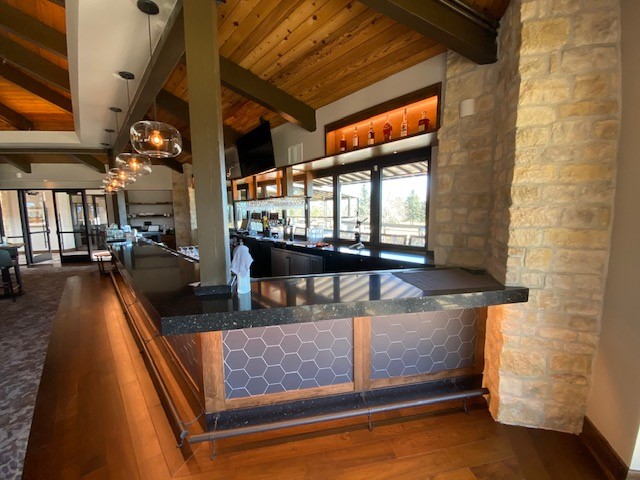
This Denver-area country club remodel project called for several different looks; along with these Cambria Blackwood™ and Berwyn™ bars, CCS also used Caesarstone Turbine Grey and Daltile Alpine White in other areas.
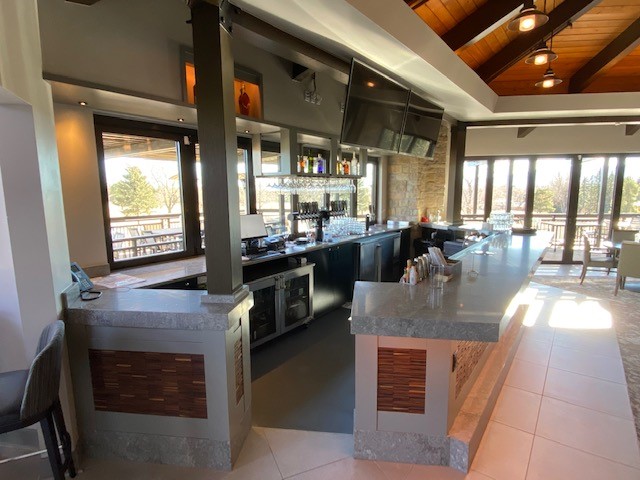
"We started slowly changing towards commercial and it was wildly successful.”
Ron Horn
Q: How do you market your company? Horn: A lot of it really is word-of-mouth and referrals. It began with a lot of cold-calling, and a lot of NOs, it is hard to get your foot in the door because of established relationships. So in the beginning, it took a little bit of persistent activity. But once we were able to get that moving, we tended to relationships and the business kept growing. And referrals have been very, very good to us. We try to network with project managers and estimators from all types of construction firms. We work very closely with vendors, with their A&D reps, and understand the ways that they're trying to go to market, and that's been successful as well. Q: Anything that you would really pin down that’s the most-effective? Horn: Well, again, a lot of a lot of hard work. Once you're in there, and when you're marketing to a general contractor, it's a little bit different than when you're marketing to a subcontractor/partner. But basically service the relationship. You can't be solely job focused when you're thinking about growing your business and keeping that stream moving. Obviously, you have projects that have to be completed but service the relationship from A to Z. Retention is key. We know we're only as good as we are today, yesterday is gone. We try to be proactive and earn our keep. We do the thinking that helps take some of the responsibility off of some of our partners. Commercial construction has a language and a cadence – we talk the talk and walk the walk. Q: With commercial, is it something that because you're doing that that you have to look at your supply chain differently? Have you had to really adapt over the years as to how you source all of your material? Horn: No, I wouldn't really say so. We've done some multifamily, but that really isn't the type of commercial work that I go after very strongly. We've been overseas to China, and we have some good relationships in Brazil. And certainly, we've got some local partners here in Denver, that can help us reach places like Turkey and Italy, for some of the larger projects. A lot of what we work with, being commercial, is specification-driven. We work really hard to help suppliers that have developed those specs to keep their material in the project. We honor that in trying to hold the spec. We've built good relationships with all the local and national vendors, so we know when to approach them on a project and to partner up with them, and if there's a need for some type of aggressive posturing in the pricing phase then we can address that together. Q: Are you planning on any any kind of new services in the next year or so, or are there some things where you see some opportunity? Horn: There's nothing in particular right in front of me. We're always looking for something where we can be complimentary. But we're really focused on staying in our lane and in driving that current business model forward. We're looking for every opportunity that we could possibly explore in commercial.? Q: How are you finding employees these days? Are you really having to do some different things to try to deal with that? Horn: Well, I don't think it's ever not a struggle. You're either looking to get employees or to improve the candidates that are coming to you for employment. You're always juggling those issues. We're not in any dire straits right now. We’ve used an employment agency, but we also put a bonus out for current employees that give us a referral; they receive a bonus if a new employee stays for 90 days. I find that to be very valuable. Because we are a smaller crew and commercial is very intense and fast-paced, and you know who you really want by your side when the day from 7 a.m. to 4 p.m. goes by in the blink of an eye. The employees are very good at bringing some candidates to the table that would be people that they want to work with.
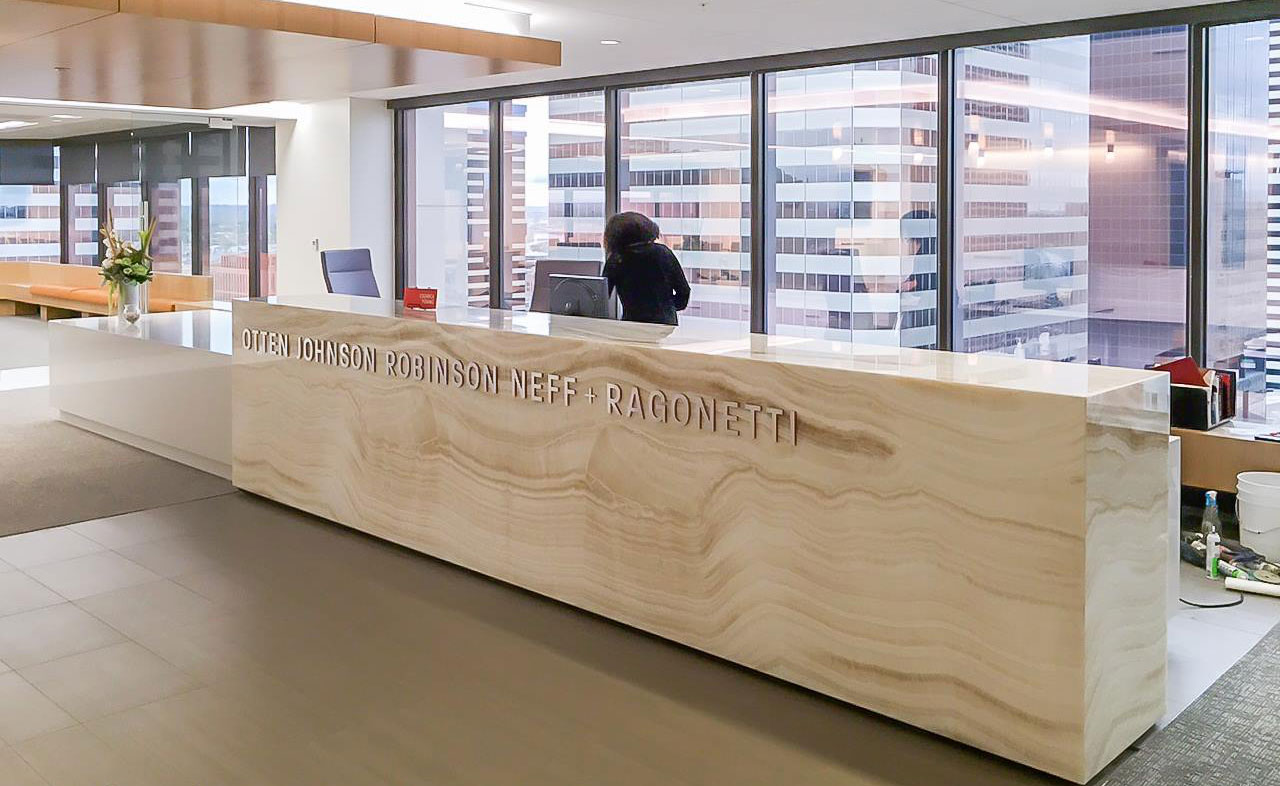
This elegant reception desk for a downtown Denver law fim uses an intriguing mix of bookmatched Vanilla onyx with Caearstone's EggShell quartz surface. (Architect, Burkett Design; designer, Gillian Johnson.)
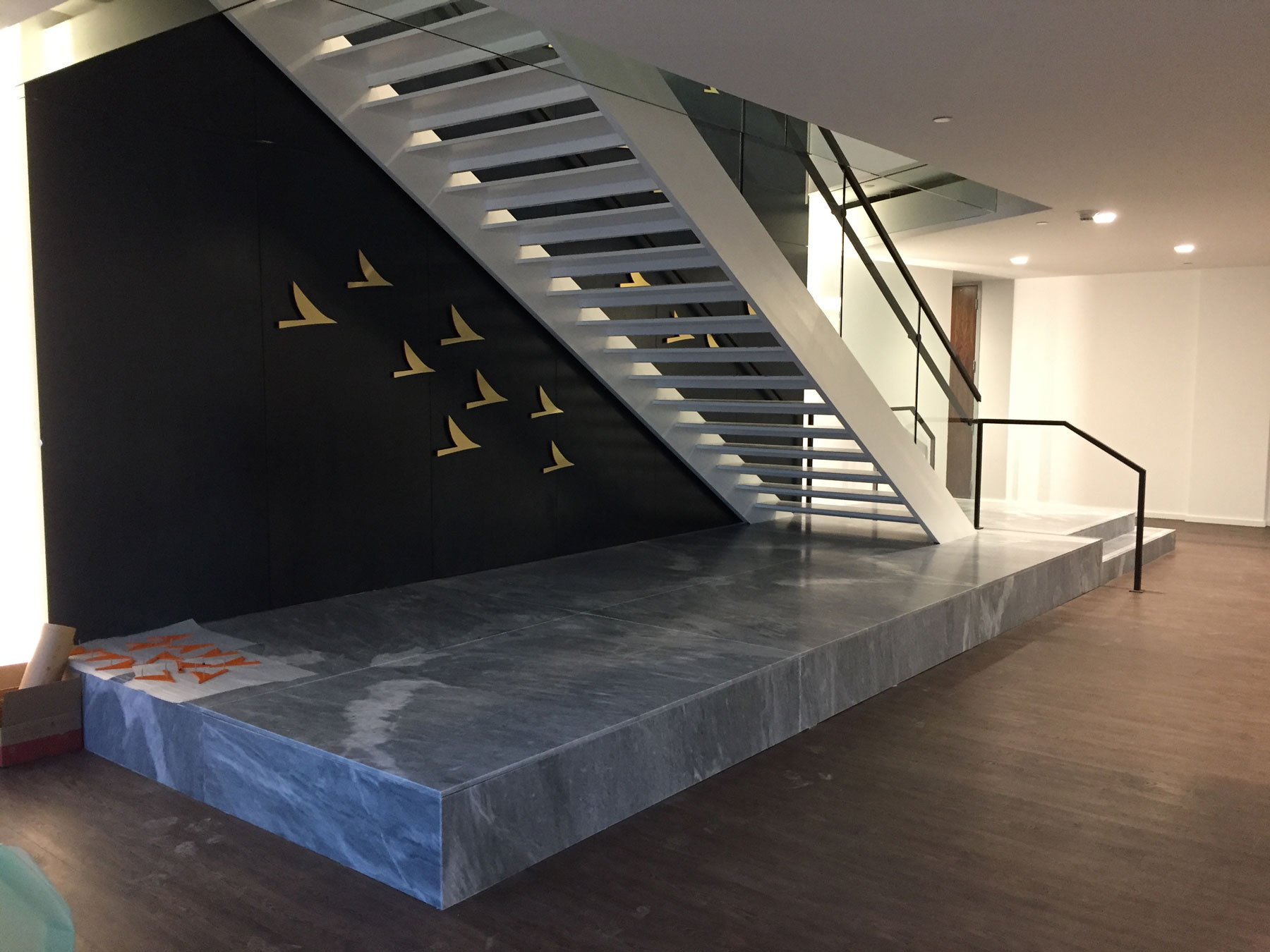
Another downtown Denver project involves Blue de Savoie marble for stairs and platform.
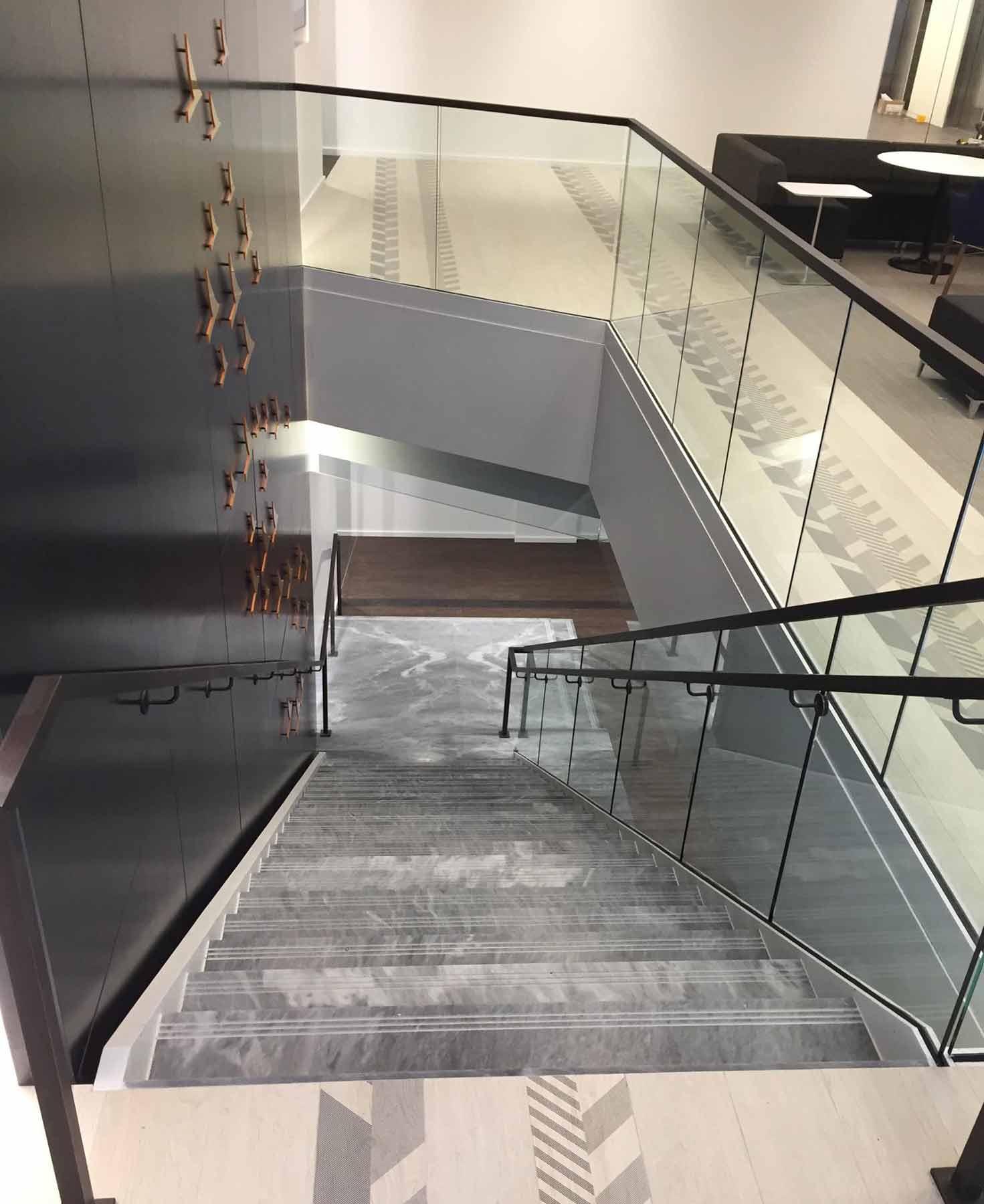
"Technology is not everything. We also have some great craftsmen that have decades and decades of experience.”
Ron Horn
Q: You just have the one location? Horn: On the north side of Denver, we have about 26,000 ft² of showroom and fabrication facilities in the same location. Q: What equipment do you have for fabrication? Horn: I think we have a really comfortable mix. We started with a CNC; it was, aside from a bridge saw, one of our first major purchases back in the day. Maybe, with hindsight always being 20-20, that was the cart before the horse. But right now we've got a great mix - a BACA dual-table saw/waterjet, a BACA miter saw, a Park PRO-EDGE, a Park Yukon and an Intermac Master 43 CNC router. We have a 15,000 lbs forklift, and we also have an overhead dual-bridge crane system with Wood’s suction lifters. Q: It sounds like you're getting a lot shoe-horned into 26,000 ft². Horn: Technology is not everything. We also have some great craftsmen that have decades and decades of experience. And we definitely rely on that heavily. We take it the extra mile, whether it's polishing back underneath on an overhang or polishing the backside of a waterfall that drops down on a break-room island. There are some things that the machines will not take care of. Our true craftsmen down in Fit and Finish, as we call it, really bring the projects to the finish line. We have a good mix of technology and craftsmanship. Q: How big of a crew do you have at this point? Horn: Between the office and the shop, we have nine people. We have four people in the office and five people in the shop. Q: Do you do much as far as installation, or is that something that the contractor will handle? Horn: No, we handle installation. We can mobilize in-house if we need to, but one of our subcontractor install crews is headed by a former employee. We always encourage people to improve themselves; he started his own business, and he's one of our crews. And then we have other crews. We can mobilize anywhere from two to five personnel, per crew, depending on the size of the install. Q: In the last year everybody has had their challenges with COVID. Were you able to basically keep things running and keep all your key employees during that time? Horn: In dealing with everything from national to state to county to local regulations, it was so difficult for everybody. Here in Colorado, we were able to qualify in construction as an essential business, and so we didn’t have to shut down. We were lucky; we had some scares, but we didn't have anybody within our facility come down with COVID. We were on top of this with signs around the place just to help remind everybody and implementing anything that we could with distancing. We split up break rooms and did everything we could within our facility to kind of go the extra mile to protect everyone. Q: Have you noticed any kind of real challenge in the market after going through COVID and now coming back out of it? With commercial space, you're dealing with areas where people get together with each other, and that's not something we were doing for quite a while. Horn: It's coming back. My residential fabricator friends tease me because they had a wildly successful time. We didn't have a bad year, but we certainly didn't enjoy the fruits that the residential fabricators were bearing. Everybody was moving back to working from home; who's remodeling an office and who's building a hotel and all these things? But I think we were very successful moving through it. We're seeing the market start to turn around. A lot of projects that we bid in late 2019, early 2020 are coming back around. So that's great. We're watching our backlog grow. We are getting newer projects, as the design community is getting busier and busier putting those projects out in the market. But we're also seeing older ones that had to hit the pause button at the beginning of the pandemic coming back to life.
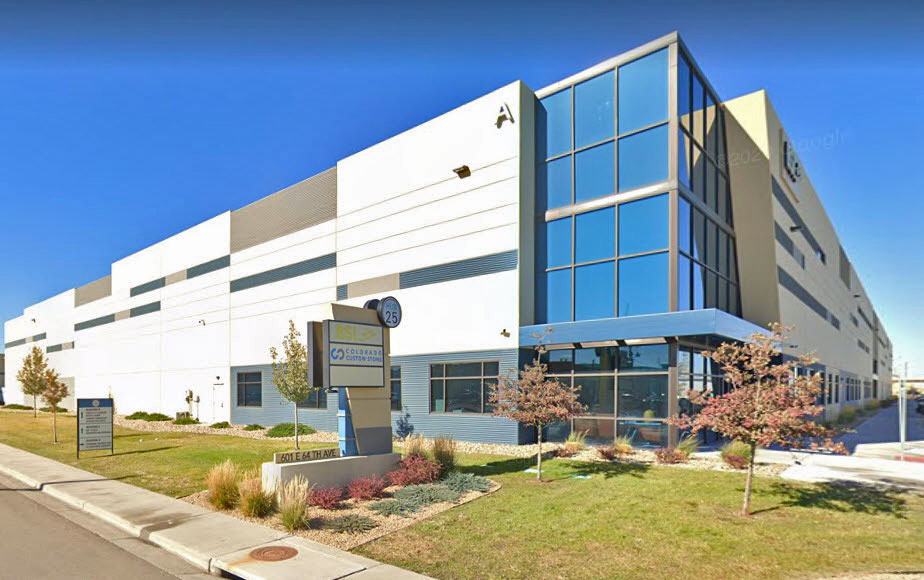
CCS moved to its new north Denver location in late spring 2018, and fills the 26,000 ft² with fabrication equitment that includes a dual-table BACA Robo SawJet.
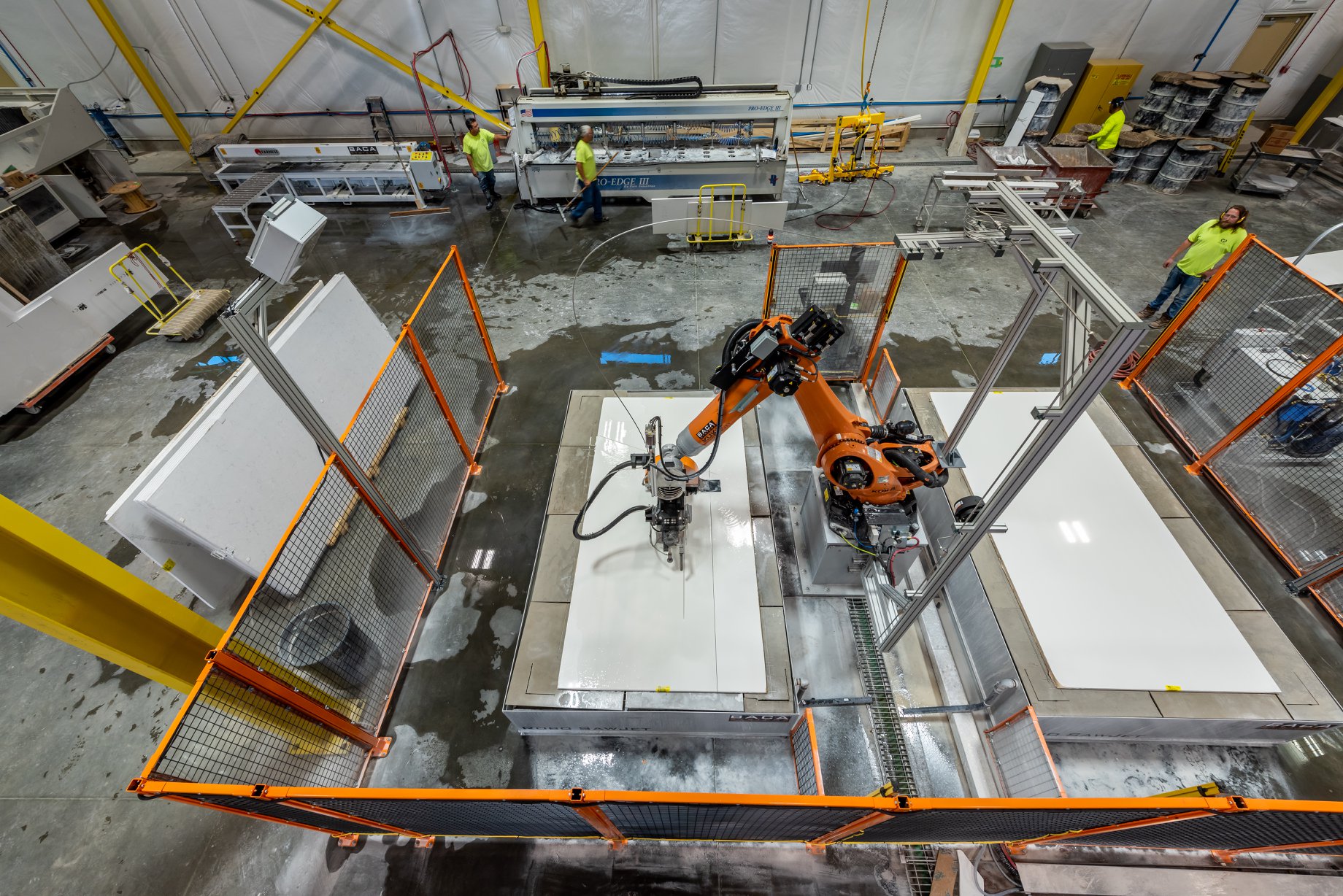
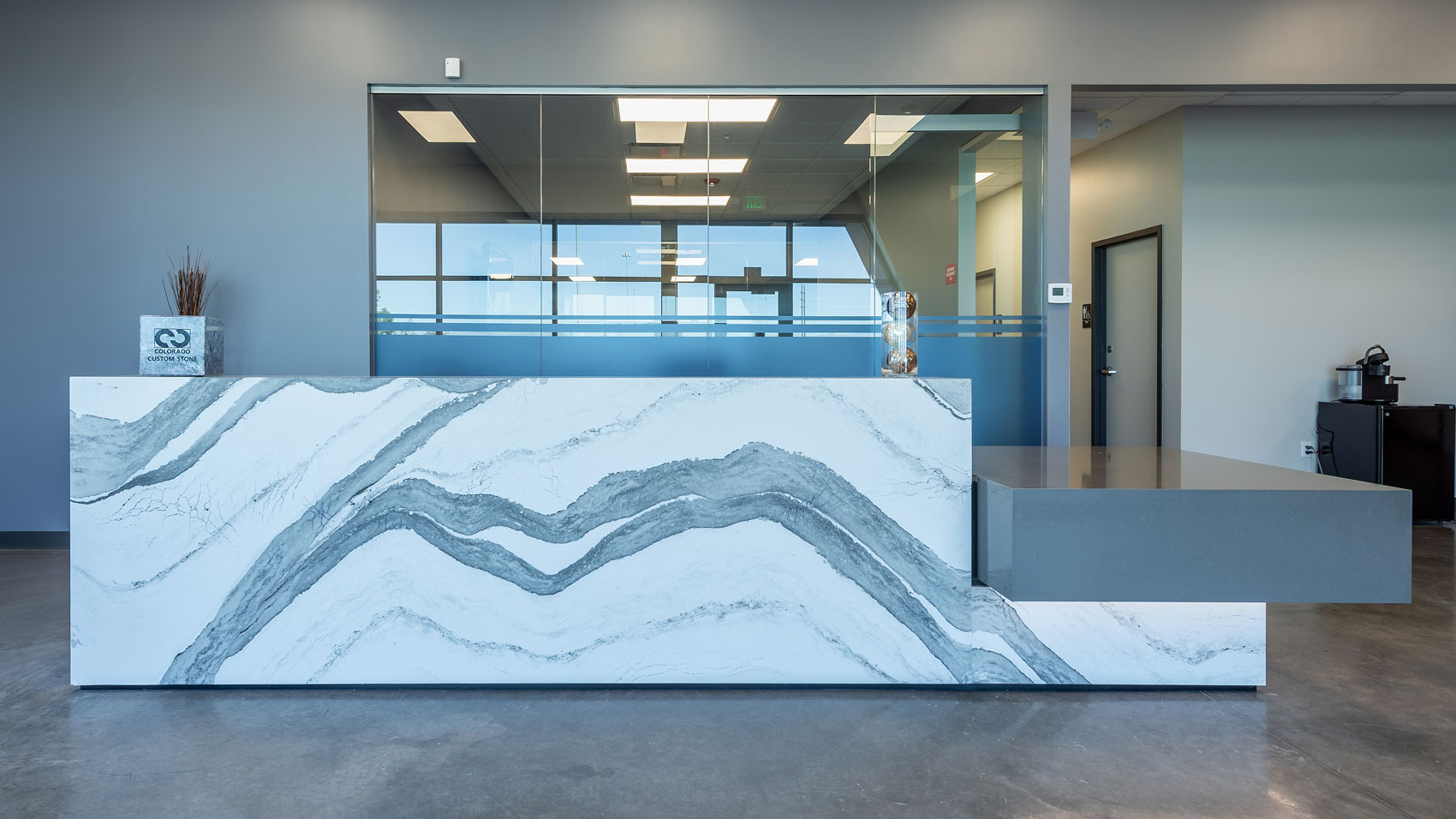
CCS doesn't spare the expertise when it comes to its own reception desk; it's also all Cambria quartz surface, with 2cm Devon™ high-gloss for the work area and 2cm Skara Brae™ matte for the upper box.
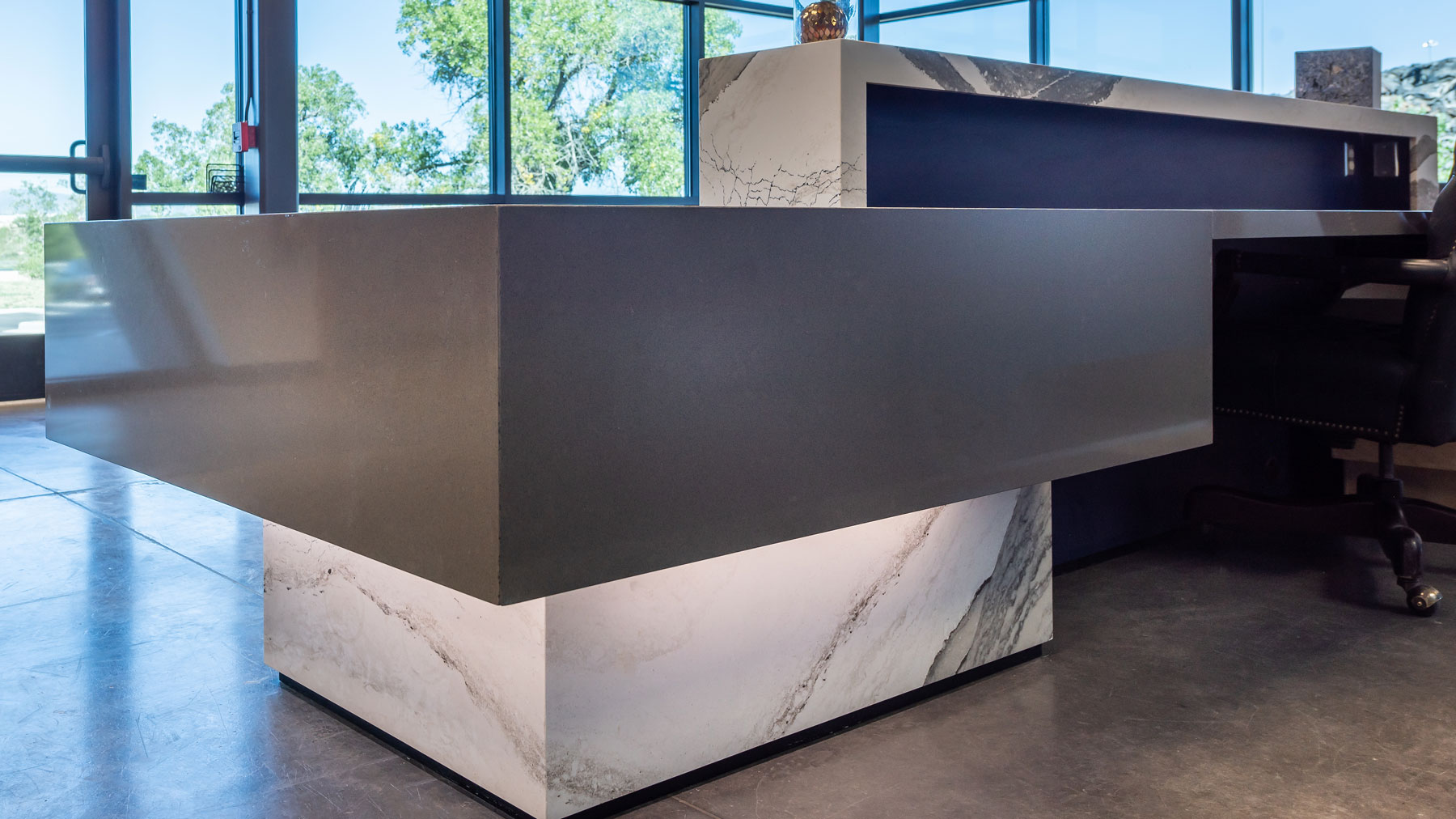
Q: Is there a job you've done that you consider to be a real success, or some really grea work? Horn: Yeah, there's quite a number of projects, but one in particular is Great West Empower, which has a facility in Greenwood Village, just south of Denver. There's some very nice, expensive material that was hand-selected from Italy and the project was packed with some great credenzas, wrapped columns and freestanding full wall.
The great challenge on this one was a 15’ high, 150’ long curved book-matched Statuarietto marble wall, clad in the front, flat on the top. We actually had a pass through going to the elevator shaft; some pieces were on the ceiling portion of the pass-through. That was one that we had to do at night. It came with its own set of challenges, being that it had to be bookmatched.
We were coming in and installing four panels at night, getting everything set -- getting all the wire tied in, everything adjusted -- because the wall is open at that point. Then we were measuring for the next set of panels during the day that would get sent in, when the night crew was done. Then we produce those pieces in the morning and have them ready for the next evening. It went on like that for quite some time.
It just turned out amazing. It really was a great project and a good feather in our cap for sure. (Editor's note: The project also included sharp work with Travertino Smoke travertine.)
Q: Any major changes you see on the horizon, whether it's a different facility, different types of equipment, coming in anything that you see coming? Horn: At this point, it's technology. We really enjoy our partnership with BACA, Park and Intermac. The technology is moving so fast; if you bought a machine three years ago, there's something that's already developed with variable speed or for the different types of materials that are coming out. But the technology is always just continuing to improve. Those people are doing a great job. We've been working with the thin porcelain slabs for quite a while now. Those are definitely growing in fondness in the A&D community. We really put in a lot of time to find the right tools, and a lot of time and money to find the right speed, the right amount of water. Being in commercial, most of my edges are going to be ease-and-polish or miter. We really took the challenge on a couple of years ago before it started hitting the market like it is nowadays. Luckily, we got a lot of our learning curve behind us early in the game. I definitely see that becoming a larger part of what we do as fabricators. Q: Where do you see things kind of going for the industry in general in the next year? Horn: The commercial has been slower coming back. We saw some good evidence of a return in January, and then it really slowed down. I think everybody was kind of looking at the second quarter, and it's perhaps taking off a little bit slower, but I think we're definitely going to see an increase. I think we're going to see some interesting changes, if you think about it, as you know, in our personal lives, your professional life, whatever, what is going to be the ultimate change that comes out of this? I'm seeing some some interesting projects. With offices, open-plan was big, as it came on in the late 1990s and early 2000s, but we're seeing office structure changing a little bit more. We're seeing more break rooms; whereas maybe there was one break room per floor of an office building, we're seeing three and four break rooms. I think we're going see a lot more people returning to work. And we're going to see that workspace change a bit where the design is going to be a little different than before the pandemic. That's exciting. Q: What’s your biggest success? Horn: Just because I had my own ideas didn't mean that I didn't have great people that brought me along and kind of enlightened my path. The success of Colorado Custom Stone is partnerships with the employees. I've got such great people. For example, Nicole Renko is a wonderful person that worked in the medical field, and just came to CCS three years ago. Nicole is one of those people that won't take no for an answer, whether it's from a vendor, or whether it's from my direction, or whatever the case. She's a real go-getter. She was recently awarded the Women in Stone Empowerment Scholarship from the Natural Stone Institute. My project managers have developed really well, and when they go out there, they're dragon-slayers. They really build great relationships. The greatest successes of CCS include our clients, our vendor partners, and our people that work here. With nine people, there are a lot of hammers swinging around here to keep building
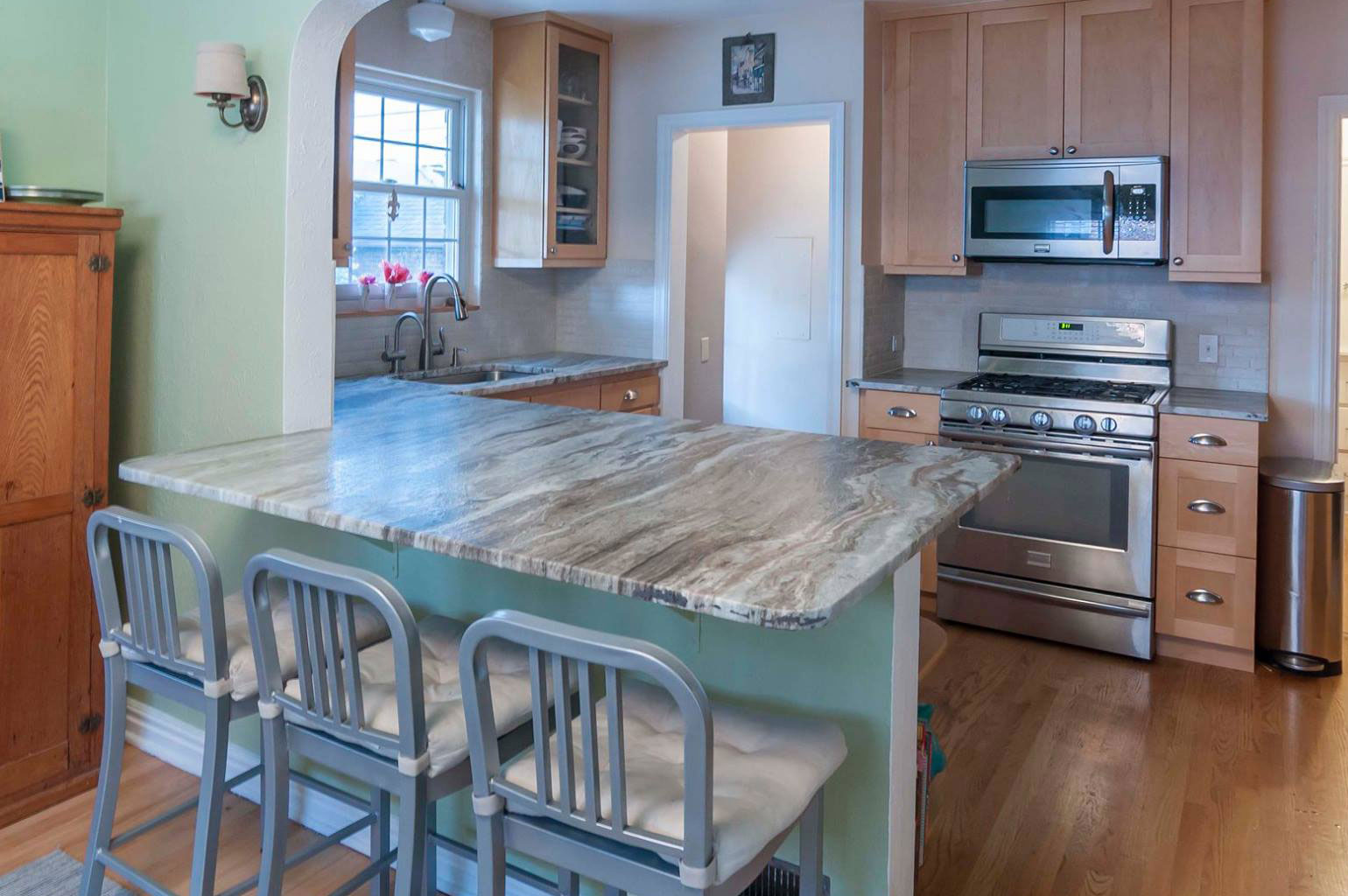
CCS works mainly with commercial projects, but the skill and precision also goes into all the company's work, including this well-done cozy kitchen in Fantasy Brown quartzite.
